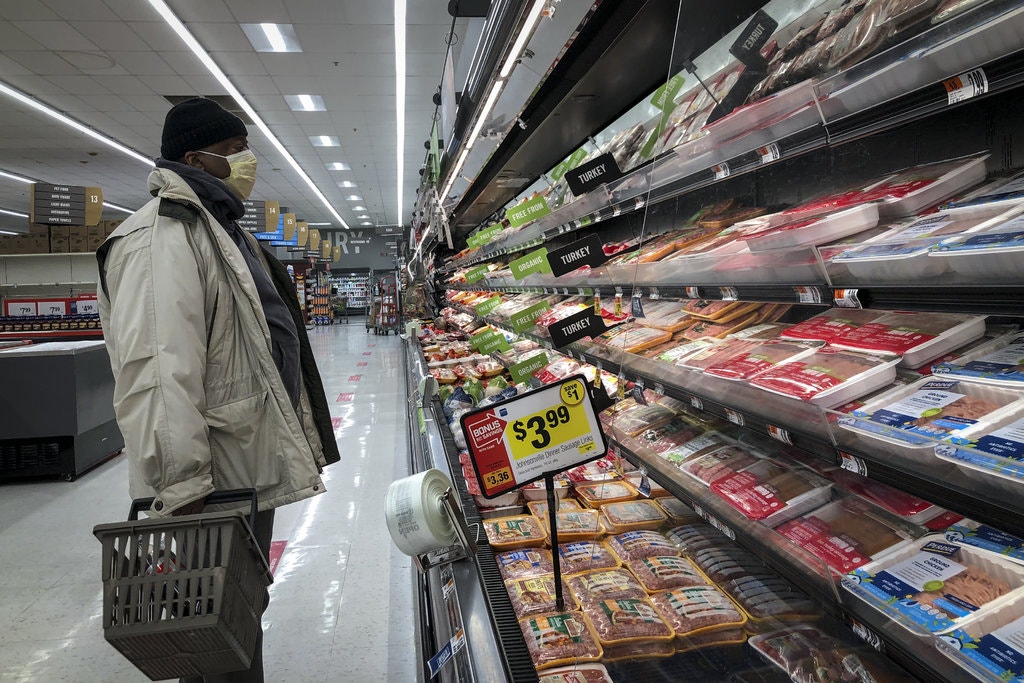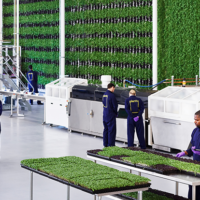
Image Source: New York Times
Every week we track the business, tech and investment trends in CPG, retail, restaurants, agriculture, cooking and health, so you don’t have to. Here are some of this week’s top headlines.
On Tuesday, Trump declared meat processing plants “critical infrastructure,” in an effort to combat the shortages of beef, pork and chicken that the head of Tyson Foods warned of in a national newspaper last week. More than 20 meat plants saw closures in the last two months, as 6,500 workers have fallen ill or are awaiting results.
The newly formed Independent Restaurant Coalition (IRC) has been at the forefront of lobbying for the independent restaurants that define our communities. Now, they’re calling upon Congress to establish a $120 billion fund to help save small restaurants.
Frontline grocery workers at some of the country’s largest corporations are organizing a historic mass strike on May Day, asking customers to boycott Amazon, Instacart, Whole Foods and Target. As these companies reap record profits, workers are fighting for basic protections as they continue to risk their lives at work.
The COVID-19 pandemic has put more than 10 million independent restaurant workers at risk of losing their jobs for good. Across sectors, businesses are being forced to pivot their business models as consumers go on lockdown and change their buying habits. This round-up features many of the ways the pandemic is impacting all parts of the food industry.
In an effort to do our part and support the community we love so dearly, we have compiled a list of resources and organizations that are providing support to those in need. We are also offering free job postings to anyone who is looking to employ people impacted by the COVID-19 pandemic.
- Resources: We have compiled a database of resources for those in the food industry impacted by the pandemic here. Please add your own resources as well.
- Jobs: We need to band together to support everyone across the food system who has lost their job due to the pandemic. Use code “coronavirusfoodjobs” to post remote or remote-friendly food jobs on our job board for free.
We need your support as well. Producing our newsletter takes a lot of time and resources, and we need to change our business model to keep it going. To date, we’ve funded our work through our events, sponsorships and consulting, which are all on hold due to the pandemic. If you find our newsletter to be a valuable resource, we hope you will consider making a one time or monthly contribution, so we can keep the newsletter going and free for those who can not afford a subscription fee. Whether it’s $5 or $500 every bit helps and shows us that you value our work. Not able to contribute right now? You can help by sharing our newsletter with friends and colleagues.
Check out our weekly round-up of last week’s top food startup, tech and innovation news below or peruse the full newsletter here.
1. Trump Declares Meat Supply ‘Critical,’ Aiming to Reopen Plants – New York Times
The executive order is meant to prevent shortages of pork, chicken and other products. But unions fear it will endanger workers in the plants, which have become coronavirus hot spots.
2. Chefs Call for $120B Restaurant Stabilization Fund – Food & Wine
The Independent Restaurant Coalition are calling for a stabilization fund to help save small restaurants. The food service industry only received 9% of PPP loan dollars, even though it accounted for 60% of job losses in March.
3. US Food-Worker Deaths Reach 20 as Thousands See Virus Impact – Bloomberg
More of America’s workers who are keeping food supplies churning are falling sick and dying.
4. The Food Supply Chain Is Breaking.’ Tyson Foods Warns of Meat Shortage as Plants Close Due to COVID-19 – Time
One of the US’s biggest meat processors warned that millions of pounds of meat would disappear from the supply chain. As a consequence, farmers across the nation will not have anywhere to sell their livestock to be processed, leading to food waste.
5. Amazon, Whole Foods, Instacart Workers Organize a Historic Mass Strike – Vice
On May 1st, frontline workers at some of the biggest corporations in the country will lead a mass strike action, asking customers to boycott Amazon, Instacart, Whole Foods and Target.
6. Meatpacking Union Says 25% of US Pork Production Hit by Coronavirus Closures – CNBC
Meatpacking plants responsible for 10% of all beef production and 25% of all pork production have closed. Thirteen packing and food processing workers have died after contracting Covid-19.
7. Two Months That Tore Apart the Food Chain – Wall Street Journal
Grocery demand skyrocketed, restaurants shut their doors and distribution became exponentially more complex, resulting in the most dramatic shift in history. For consumers, it could mean fewer choices, higher prices and an adjustment in the way we shop and stock our pantries.
8. Safe Dining? Hard to Imagine, but Many Restaurants Are Trying – New York Times
Though widespread reopenings may be a long way off, chefs and health officials have begun studying how a post-pandemic restaurant might look.
9. Online Grocery Reaches New Heights in April – Grocery Dive
Online grocery sales jumped to a record high in April, as shoppers spent $5.3b on orders for delivery and pickup. The total represents a 37% increase over March, when sales hit $4b.
10. Tracking Coronavirus Closures at Food and Beverage Factories – Food Dive
While food and beverage manufacturers scramble to keep up with demand as consumers stock their pantries, many now must also contend with coronavirus outbreaks in their factories.
11. USDA Let Millions of Pounds of Food Rot While Food Bank Demand Soared – Politico
While other federal agencies quickly adapted their programs to the coronavirus crisis, the Agriculture Department took more than a month to make its first significant move to buy up surplus fruits and vegetables.
12. Thousands of Cars Line Up at One Texas Food Bank As Job Losses Hit Hard – NPR
A record 6k families preregistered for emergency food distribution at the San Antonio Food Bank, and when word got out on social media, another 4k cars showed up.
13. What’s in Store for Agrifood Investing in the Wake of Covid-19? – AgFunder
Blake Stevens of Alexandria Investments and Dave Friedberg of Climate Corporation joined AgFunder to discuss the future of agrifood investing and the technology trends we can expect to arise from it.
14. Too Many People Are Going Hungry Right Now. Harris, Gillibrand and Sanders Are Offering a Lifeline. – Mother Jones
The lawmakers’ Closing the Meal Gap Act would increase the benefit to individuals and families by 30% and allow territories like Puerto Rico, American Samoa and Northern Mariana Islands to receive food assistance as an entitlement, instead of a block grant.
15. Pivot Bio Raises $100M Series C to Meet Demand for Sold-Out Nitrogen-Fixing Microbe Product – AgFunder
Breakthrough Energy Ventures and Temasek led the round. The new funding will help the company scale its microbial nitrogen technology that promises to help farmers boost crop yield.
16. Cheetah, a Restaurant Wholesale App That Pivoted to Consumers for Covid-19, Nabs $36M – TechCrunch
Eclipse Ventures led the round, bringing total raised to $66m. Funding will go towards expanding its business and to help it stay the course through the pandemic.
Our newsletter is the absolute easiest way to stay on top of the emerging sector, so sign up for it today and never miss the latest food tech and innovation news and trends, Already signed up? Share the love with your friends and colleagues!





